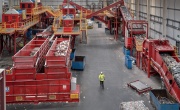Scotland to further explore DRS ‘opportunities’
 More consideration is needed before a decision can be made about whether to implement a deposit-return scheme (DRS) in Scotland, Environment Secretary Richard Lochhead has said.
More consideration is needed before a decision can be made about whether to implement a deposit-return scheme (DRS) in Scotland, Environment Secretary Richard Lochhead has said.
In early 2015, the Scottish Government commissioned ZWS to carry out a feasibility study on the potential introduction of a national DRS in Scotland. This study, undertaken by Eunomia Research and Consulting, was published in May.
Responses to a subsequent call for evidence, available on the ZWS website, along with a summary report, have now identified a number of areas that need further consideration, including a clearer definition of the material falling within the scope of a DRS, the interaction with LA kerbside collections, impact on price, evidence of behaviour change and retailer and manufacturing costs.
Zero Waste Scotland (ZWS) will now be asked to undertake further research into some issues, with particular focus on the retailer costs and implications for small stores under any potential scheme and drawing, where appropriate on experience in other countries.
Specifically, the Scottish Government has asked for further consideration of the following ‘priority areas’:
- more accurately quantifying material ‘within scope’ of a deposit-return system;
- evaluating the interaction with kerbside collections provided by local authorities;
- assessing the time requirements for public participation;
- retailer and manufacturing costs, including space requirements, online shopping, et cetera;
- factors affecting countries that have decided against DRSs;
- more accurately identifying the value of litter reduction and improved recycling;
- impact on price;
- consideration of hygiene issues in-store and during haulage; and
- evidence of behaviour change.
In a statement released last week (30 December), Lochhead confirmed that he has commissioned further research from Zero Waste Scotland to explore ‘opportunities’ of a DRS, and that he will begin discussions with ministers from across the UK to explore the issues further.
‘Attaching value to waste’
In his statement calling for further exploration of the ‘opportunities’ of a Scottish DRS, Lochhead said: “Like carrier bag charging, deposit-return schemes attach a value to items that can otherwise be viewed as waste, and have proven successful in other countries at reducing litter and increasing recycling.
“The evidence gathered by ZWS highlights some of the potential benefits and concerns associated with a DRS for Scotland. I am listening closely as I consider whether such a scheme – which has worked successfully in other countries – would be right for Scotland.
“In light of Belgium’s recent suggestion for an EU-wide deposit return scheme to help tackle litter and recycling, I intend to invite ministers from Wales, Northern Ireland and the UK government to Edinburgh next spring to discuss these new findings.
“In the meantime, I have asked ZWS to undertake further work to look into the important issues raised by businesses, NGOs, and local government, which include the implications for small stores, costs to retailers, and changes in customer behaviour where a deposit-return scheme has been in place.”
Wales also considering DRS
The move from Scotland comes as the National Assembly of Wales has also been debating implementing a DRS in Wales, with the Welsh Conservatives strongly backing a deposit system. The party has said that should it be voted into the Welsh Government in May’s elections it would introduce a pilot system. Carl Sargeant, Minister for Natural Resources in the Labour-majority Welsh Government, has said that although he has an open mind on a deposit system, the costs and implications would have to be investigated thoroughly before any action is taken.
Learn more about the arguments for and against DRSs in comment pieces from Resource 71.






